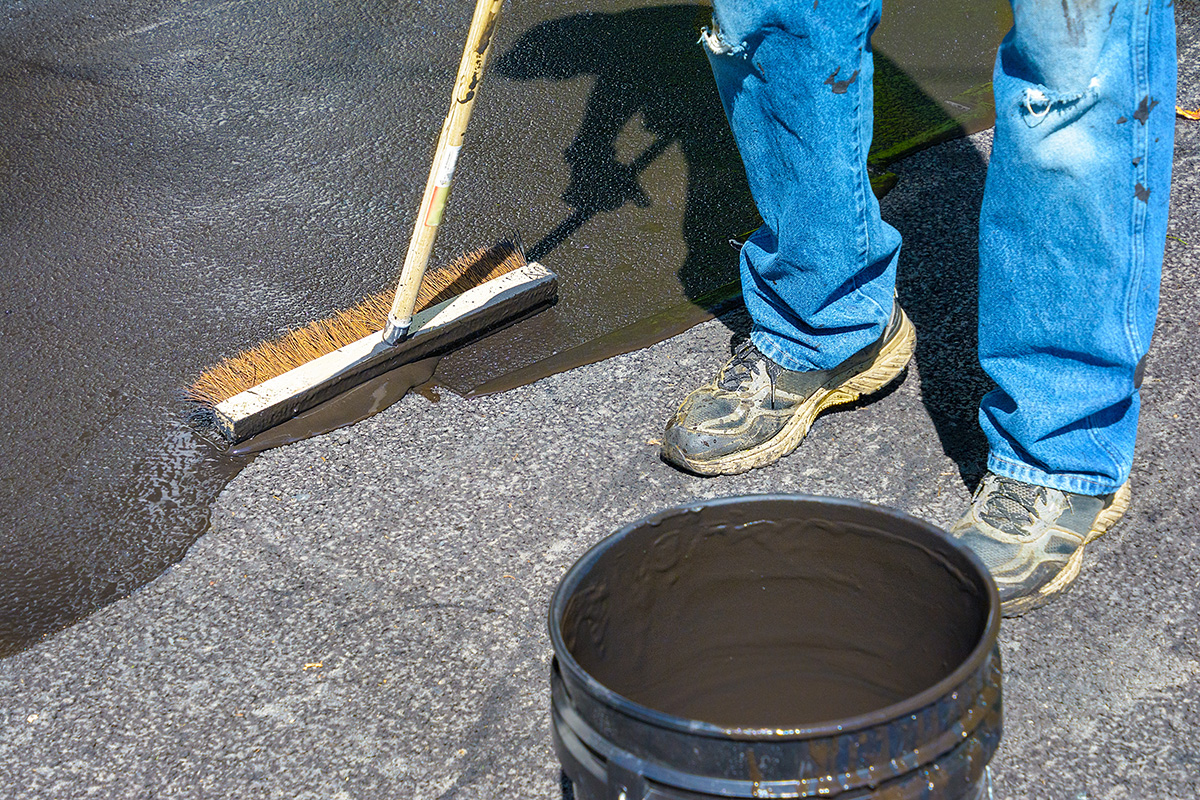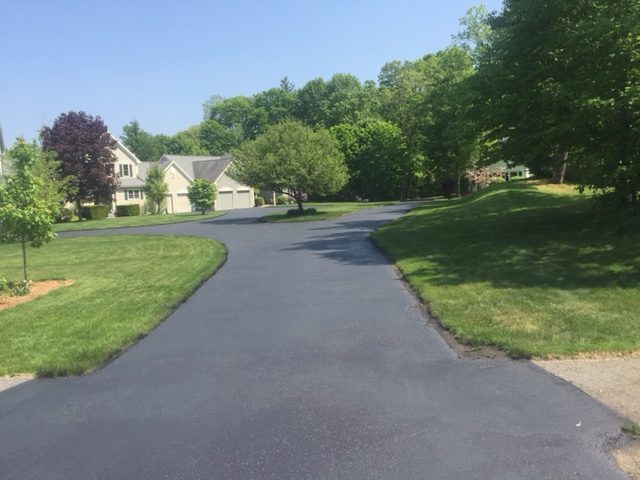Boost Commercial Charm: Warm Mix Asphalt Sealing for Angled Parking Lots
Boost Commercial Charm: Warm Mix Asphalt Sealing for Angled Parking Lots
Blog Article
Warm Mix Asphalt: A Lasting Remedy for Sidewalk
Warm Mix Asphalt (HMA) has actually emerged as a leading lasting selection for pavement remedies, providing a myriad of environmental advantages and ingenious technologies. As the demand for environmentally friendly building methods grows, discovering the subtleties of HMA's sustainability can offer important insights into the future of sidewalk remedies.
Environmental Benefits of Warm Mix Asphalt

In Addition, Hot Mix Asphalt assists to reduce city heat island results. Its dark color absorbs sunshine, decreasing the quantity of warmth showed back right into the atmosphere compared to lighter-colored pavements. This can reduce ambient temperatures in city locations, lowering the demand for a/c and ultimately lowering power intake.
Additionally, Warm Mix Asphalt contributes to improved stormwater management. Its porous nature enables water to reenergize and penetrate the pavement groundwater products, lowering runoff and the threat of flooding. These ecological advantages make Hot Mix Asphalt a lasting choice for leading freeways and roadways.
Energy Effectiveness in HMA Production
Is power effectiveness a crucial variable in the manufacturing of Warm Mix Asphalt (HMA)? Absolutely. Energy plays a substantial duty in the production of HMA, influencing both cost and ecological sustainability. One essential aspect of energy effectiveness in HMA production is using warm mix asphalt (WMA) technologies (commercial parking lot paving). WMA enables the mixing and placement of asphalt at lower temperature levels compared to standard warm mix asphalt, resulting in minimized energy usage during manufacturing. This process not only reduces fuel usage but likewise reduces greenhouse gas emissions, making it a more environmentally pleasant alternative.
Additionally, improvements in plant modern technologies have led to more energy-efficient HMA production procedures. Modern plants are developed with attributes like recycled asphalt pavement (RAP) handling capabilities, reliable burner systems, and boosted insulation, all adding to power savings. By maximizing energy use in HMA manufacturing, the market can reduce its carbon impact while keeping high-grade pavement products. Power effectiveness is, consequently, a critical consideration in making sure the sustainability of Warm Mix Asphalt production.
Recyclability of Hot Mix Asphalt
The recyclability of Hot Mix Asphalt (HMA) is an essential facet of its sustainability and long-term environmental effect. HMA is just one of one of the most recycled materials in the United States, with over 100 million lots of reclaimed asphalt pavement (RAP) being reused each year in new pavement building. Reusing HMA supplies numerous ecological advantages, such as minimizing the demand for virgin products, decreasing power intake throughout manufacturing, and lowering the quantity of waste sent out to land fills.
The process of recycling HMA involves grating the existing sidewalk, squashing it Recommended Reading into smaller pieces, and mixing it with new aggregate and asphalt binder to produce a recycled mix. This recycled mix can usually perform as well as or perhaps better than conventional HMA, while requiring less resources and generating reduced greenhouse gas discharges. By integrating RAP into new pavement tasks, roadway companies can save natural deposits, lower prices, and lessen the ecological footprint of road construction and upkeep tasks. Generally, the recyclability of HMA plays a considerable function in promoting lasting techniques within the pavement industry.

Long-Term Efficiency of HMA
Asphalt sidewalks show durability and resilience over an extended period, reflecting the long-lasting performance of Hot Mix Asphalt (HMA) The durability of HMA can be associated to its capability to stand up to hefty traffic loads, severe weather conditions, and the effects of aging. Studies have actually revealed that properly designed and appropriately built HMA pavements can last for twenty years or even more with regular maintenance. The trick to optimizing the long-lasting performance of HMA exists in utilizing top quality products, adhering to ideal techniques in building and construction, and applying efficient maintenance strategies. Correct drain, routine inspections, and prompt repair services are vital for preserving the architectural stability of HMA pavements with time. In addition, innovations in HMA modern technology, such as making use of polymer-modified binders and warm mix asphalt, have actually even more boosted the longevity and durability of HMA sidewalks. By focusing on quality building and construction and maintenance techniques, HMA remains to confirm itself as a lasting and cost-effective remedy for lasting sidewalk infrastructure.

HMA: Longevity and Sustainability
Showing both sturdiness and sustainability, Hot Mix Asphalt (HMA) has actually become a keystone in the building of durable sidewalk facilities - hot mix asphalt. HMA's longevity originates from its ability to stand up to heavy tons, severe weather conditions, and high website traffic volumes, making it a reliable option for highways, highways, and flight terminal paths. The composition of HMA, which commonly includes aggregates, binder, and filler, plays a crucial function in improving its long life and resistance to damage
Moreover, HMA's sustainability depends on its recyclability and energy-efficient production procedure. The next page capacity to reuse recovered asphalt sidewalk (RAP) in brand-new HMA mixtures decreases the need for virgin products and decreases the environmental effect of pavement building and construction and upkeep. Additionally, the energy effectiveness of creating HMA exists in its reduced blending temperature levels compared to other pavement materials, causing lowered energy consumption and greenhouse gas discharges.
Verdict
Finally, warm mix asphalt (HMA) offers a sustainable solution for pavement with its ecologically pleasant characteristics. HMA's recyclability, energy effectiveness in production, and long-lasting toughness make it an eco-friendly choice for roadway construction. By preserving natural deposits, minimizing waste, and reducing greenhouse gas discharges, HMA plays an important function in promoting sustainability in infrastructure growth. Its capacity to alleviate metropolitan heat island effects further emphasizes its relevance in developing resilient and ecologically mindful sidewalk systems.
HMA is one of the most recycled materials in the United States, with over 100 million bunches of recovered asphalt pavement (RAP) being recycled yearly in brand-new pavement construction.The process of reusing HMA involves grating the existing pavement, squashing it into smaller sized pieces, and blending it with brand-new aggregate and asphalt binder to develop a recycled mix.Asphalt pavements show sturdiness and resilience over a prolonged period, showing site the long-term performance of Warm Mix Asphalt (HMA) Additionally, innovations in HMA innovation, such as the usage of polymer-modified binders and warm mix asphalt, have actually further improved the durability and durability of HMA sidewalks. The ability to reuse redeemed asphalt pavement (RAP) in new HMA combinations reduces the demand for virgin products and minimizes the environmental effect of sidewalk construction and maintenance.
Report this page